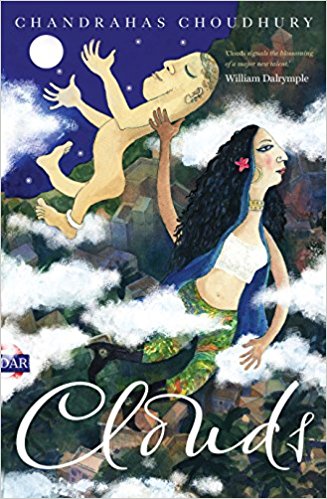Conceived as a short story like Ulysses and penned as one, unlike Ulysses, and having the same gestation period—8 years—as Ulysses, Clouds is Chandrahas Choudhury’s second novel. The parallel may even extend a little further. Writing in the second decade of the twenty-first century and writing in English in India, Choudhury may be said to have faced the same problem that James Joyce did, crafting his modernist fiction almost a hundred years ago. The problem is this: how to fashion a prosaic world into an aesthetic form that can nevertheless double as an alluring commodity—in a word, fiction. Yes, fiction is pre-eminently the capitalistic form—perhaps I can use the word unabashedly, seeing that it is not a taboo word anymore either in criticism or in literature, as the novel under review demonstrates—because it exists to meld into unity the warring desires for beauty and utility, for love and money. Not all fiction foreground this as stylishly as Clouds does. In hitting upon fiction as form, as he made the crucial transition from literary criticism and reviewing—he still practises both—Choudhury seems to have been face to face with this truth about novels far more insistently than in his first novel, Aarzee the Dwarf, published in 2009. This core truth is none other than a perceived contradiction between the concrete and the abstract, or, to cite another prominent antinomy voiced by an important female character from the novel, Hemlata, the face of love and the bodies of lust that characterizes our experience in a postmodern society, and that which the novel form is invited to resolve.
Clouds has a remarkable opening. Standing on a milling Bombay street, Farhad Billimoria, the central character of the novel—or, I should perhaps say, of the Bombay section of the novel, the novel being split almost evenly between a city part and a country part (Choudhury drags in here a tribal village from his home State Odisha)—is faced with sudden doubt. Is the ravishingly beautiful woman he had met the night before at a party somewhere in the vicinity, as the perfume wafting in the air seems to suggest? Or is it an illusion of commodification, a trick produced by the assembly line production of capitalism: ‘Already, though, I could see a flaw in my scented syllogism. Was I in the vicinity of not Zahra herself but only of the perfume she favoured? Was this another victory of the endless replicability of the capitalistic world over the particularity of human beings?’ (p. 3).
This is a dilemma that resonates throughout, taking on new forms and expressions, but with no hope of easy resolution except at a personal or subjective level. The author himself breaks cover to declare in a telling parenthesis: ‘The day this tension is eliminated, humanity perishes’ (p. 3). It is this confrontation of the question that is foundational to the postmodern experience that lifts Clouds from the common run of Anglophone novels dealing with familial and national issues, and places it in the top order of contemporary novels that are local and global at the same time.

